On 12 March 2020, Leo Varadkar gave his now famous speech to the Irish public from Washington DC during his St Patrick’s Day visit to the US.
It was 11am Irish time when Varadkar descended the steps of Blair House beside the White House to inform the Irish public the country was headed into its first lockdown in a bid to contain the rampant spread of the COVID-19 virus.
It’s now over a year since COVID-19 first barged its way into our daily lives and that historic speech from the then Taoiseach seems like a lifetime ago for many. However, for JP Scally, chief executive of Lidl Ireland and Northern Ireland, the memory of that day is still clearly etched in his mind.
“I remember Leo Varadkar started his speech at 11am that morning and by 11.30am things were already kicking off. Within minutes, our stores became overrun with panicked customers stockpiling food, toilet paper and other staples they could get their hands on,” says Scally.
“I remember it was a really tough time for all our store teams. It was pure panic-buying and it lasted for the rest of that week,” he adds.
Empty shelves
The sight of empty supermarket shelves all over Ireland became a defining image in the early days of the first lockdown as worried consumers, understandably, sought to stock up on essentials.
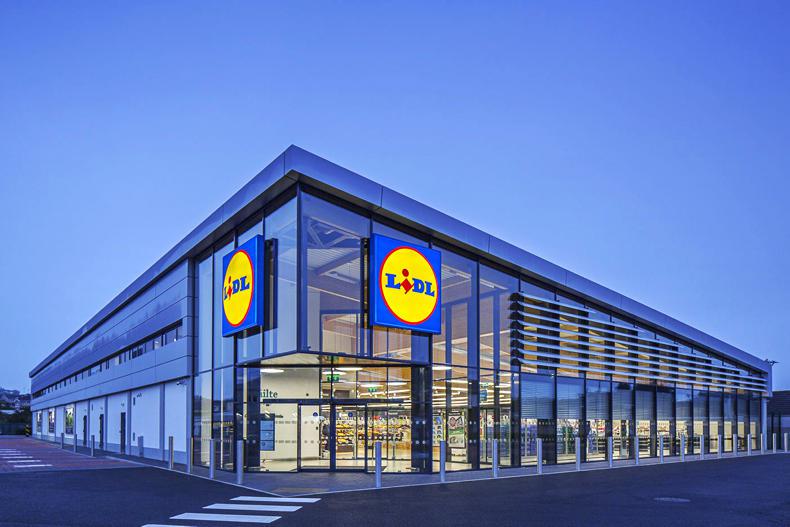
Lidl.
While things have since settled down, supermarkets and the grocery retail channel have played an essential role over the last year to keep the entire country fed.
As it turned out, March 2020 ended up being a bigger month for grocery sales than Christmas, with almost €1.1bn spent on groceries and other essentials.
“The initial panic-buying phase put huge pressure on supply chains around the world. We saw what had happened in China and Italy so we had been gradually building stocks throughout the month of February. And we had just opened our new 54,000sq ft distribution centre in Kildare, which helped.
“Thankfully, we were able to quickly scale up to demand due to our robust and agile supply chain, including the large network of local Irish suppliers we work with,” says Scally.
“For the first month, we were working 24/7 with our suppliers trying to secure supply day after day. Imports of certain products became a challenge. For example, it was very hard to get pasta because Italy was really hard hit by COVID-19 and a lot of the facilities were closed. Then flour became really short when the home-baking craze took off and eggs became difficult to source due to an outbreak of avian influenza,” he says.
Aside from food, Scally says cleaning materials became very scarce because there was a 400% to 500% increase in sales volume in that category as shoppers stocked up on domestic cleaning products.
However, once the initial wave of panic-buying settled down and consumers could see that food supply chains were holding up, Scally says a new phase took over with Irish consumers switching to less frequent trips to the supermarket but for much bigger shops.
Consumer trends
Given his position as CEO of Ireland’s fourth largest retailer, Scally has had a bird’s eye view of the consumer food trends that have emerged in the past year. So what were Irish consumers buying last year?
“We definitely saw Irish consumers treating themselves a lot more last year. We saw big increases in sales of things like fresh produce and premium beef.
“Our sales of premium Angus steaks were up 60% last year. And, of course, alcohol sales did very well because people were stuck at home,” says Scally.
Our sales of premium Angus steaks were up 60% last year
Recognising that consumers were indulging more during lockdown, Lidl introduced new ranges of premium, fresh desserts and expanded its coffee beans range with consumers looking for premium coffee products to replace the barista coffee from work or the city.
Other food products like potatoes, gravy stocks and any product lines linked to baking, such as dried fruit or baking soda, did really well last year as consumers were forced to cook at home more than ever before.
“I think a lot of Irish consumers really re-connected with food last year because they had time to cook again. There is definitely more appreciation for good food and many people have learned that home cooking is not so difficult. In saying that, there is definitely a lot of cooking fatigue out there right now,” says Scally.
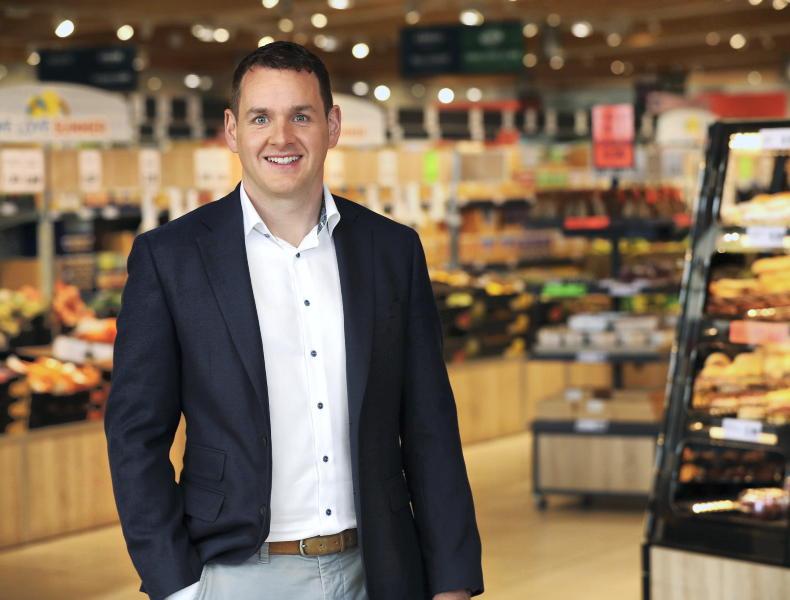
JP Scally, CEO of Lidl Ireland and Northern Ireland.
Interestingly, while traditional meat and fresh produce sales saw a big bounce last year, Scally says there was a notable increase in sales of Lidl’s range of “reduced-meat” products, which are a new range of half quinoa-half beef products that Lidl has developed in partnership with Irish beef company Liffey Meats.
In contrast to the bumper sales in most categories of the food aisles, the Lidl boss says it was interesting to see how sales of cosmetics and grooming products such as shaving foam, deodorants and shower gel went in the opposite direction last year.
Long-term
With a full year now passed since COVID-19 first turned our lives upside down, what consumer food trends does Scally feel may continue after society begins to reopen and return to normal?
“I actually think the consumer trend that emerges from COVID-19 is going to be the return of value shopping. I said consumers were treating themselves a lot more in the last year but we could see this trend was changing near the end of the year,” says Scally.
“Since the end of 2020 and right through from the start of this year it’s clear that people are now starting to watch the pennies. They are focusing on value for money now in their shopping because there are real fears of a recession out there.
“People are worried about what will happen to their jobs and businesses after the Government’s COVID-19 supports end,” he adds.
If this is the case, Scally is likely seeing a trend that has so far been invisible in unemployment figures and other economic data.
Many economists have warned that the Government wage subsidy scheme and other supports are keeping many Irish businesses on life-support and that a recession is likely for the Irish economy once those supports finish.
Consumer demand
For Lidl, consumer demand for value in their weekly shop will certainly be a major opportunity to continue to grow its Irish business. From a standing start, the German retailer has eked out a 12% share of the €10bn grocery market in Ireland.
Over the next year, Lidl says it aims to create 1,200 new jobs and plans to open an additional six stores.
The supermarket giant already operates 209 stores in Ireland and currently employs about 6,000 people.
I think a lot of Irish consumers really re-connected with food last year because they had time to cook again
Scally says employees of supermarkets and grocery retailers literally found themselves working at the frontline of the COVID-19 pandemic last year, helping to keep critical food supply chains open all over the world.
And while there have been many challenges since last March, Scally says it has been really heart-warming to see the number of cards and letters sent in to the staff at Lidl by Irish consumers as a thank you for the role they’ve played over the last year.
In recognition of the role they’ve played throughout the pandemic, Scally says Lidl Ireland has paid out three bonus payments to all its staff in the past year, with the latest bonus payment totalling €2m.
Sustainability
Aside from consumer food trends, Scally says the big focus in the grocery sector is now firmly on sustainability.
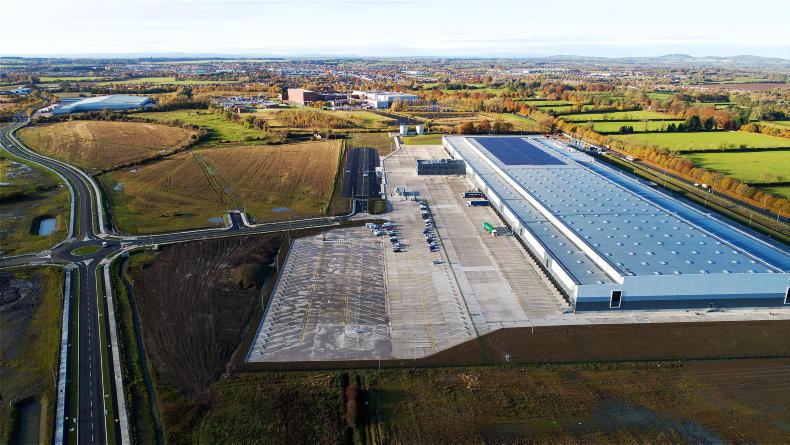
Lidl's 54,000sq ft distribution centre in Kildare.
Earlier this year, Lidl announced that it was phasing out the circulation of almost 6.3m plastic “Bags for Life” and will instead offer customers the option to buy a heavier-duty shopping bag made from 100% recycled material.
The retailer plans to increase the number of electric charging points at its network of stories and has recently announced a new partnership in Northern Ireland where eight of its delivery trucks will be powered by renewable bio-methane (biogas) produced from food waste.
“The one thing I see is that consumers are more and more interested in sustainability.
“A lot of consumers have a new-found appreciation for nature because of COVID-19 and they want the economic recovery from the pandemic to be a green recovery’,” says Scally.
Although there is now some light at the end of the tunnel with the vaccine rollout, it’s still very difficult to predict how the Irish, and indeed global, economy will emerge post-COVID-19.
On the one hand, consumers have never saved as much cash as they have in the last year and most will be eager to spend some of these savings as soon as they can, be it on a holiday abroad, weekend trip away, a night out or dinner in their favourite restaurant.
On the other hand, many consumers are clearly worried about their job security or the future of their own business, particularly when the Government supports for COVID-19 inevitably come to an end.
Yet judging by what JP Scally and Lidl are seeing in terms of consumer shopping habits since Christmas, it looks likely that many Irish consumers are already tightening their belts in anticipation of a difficult period ahead.
March 2020 was a bigger month for grocery sales than December.Sales of cleaning products soared at the start of lockdown.Consumers will return to value shopping.
On 12 March 2020, Leo Varadkar gave his now famous speech to the Irish public from Washington DC during his St Patrick’s Day visit to the US.
It was 11am Irish time when Varadkar descended the steps of Blair House beside the White House to inform the Irish public the country was headed into its first lockdown in a bid to contain the rampant spread of the COVID-19 virus.
It’s now over a year since COVID-19 first barged its way into our daily lives and that historic speech from the then Taoiseach seems like a lifetime ago for many. However, for JP Scally, chief executive of Lidl Ireland and Northern Ireland, the memory of that day is still clearly etched in his mind.
“I remember Leo Varadkar started his speech at 11am that morning and by 11.30am things were already kicking off. Within minutes, our stores became overrun with panicked customers stockpiling food, toilet paper and other staples they could get their hands on,” says Scally.
“I remember it was a really tough time for all our store teams. It was pure panic-buying and it lasted for the rest of that week,” he adds.
Empty shelves
The sight of empty supermarket shelves all over Ireland became a defining image in the early days of the first lockdown as worried consumers, understandably, sought to stock up on essentials.

Lidl.
While things have since settled down, supermarkets and the grocery retail channel have played an essential role over the last year to keep the entire country fed.
As it turned out, March 2020 ended up being a bigger month for grocery sales than Christmas, with almost €1.1bn spent on groceries and other essentials.
“The initial panic-buying phase put huge pressure on supply chains around the world. We saw what had happened in China and Italy so we had been gradually building stocks throughout the month of February. And we had just opened our new 54,000sq ft distribution centre in Kildare, which helped.
“Thankfully, we were able to quickly scale up to demand due to our robust and agile supply chain, including the large network of local Irish suppliers we work with,” says Scally.
“For the first month, we were working 24/7 with our suppliers trying to secure supply day after day. Imports of certain products became a challenge. For example, it was very hard to get pasta because Italy was really hard hit by COVID-19 and a lot of the facilities were closed. Then flour became really short when the home-baking craze took off and eggs became difficult to source due to an outbreak of avian influenza,” he says.
Aside from food, Scally says cleaning materials became very scarce because there was a 400% to 500% increase in sales volume in that category as shoppers stocked up on domestic cleaning products.
However, once the initial wave of panic-buying settled down and consumers could see that food supply chains were holding up, Scally says a new phase took over with Irish consumers switching to less frequent trips to the supermarket but for much bigger shops.
Consumer trends
Given his position as CEO of Ireland’s fourth largest retailer, Scally has had a bird’s eye view of the consumer food trends that have emerged in the past year. So what were Irish consumers buying last year?
“We definitely saw Irish consumers treating themselves a lot more last year. We saw big increases in sales of things like fresh produce and premium beef.
“Our sales of premium Angus steaks were up 60% last year. And, of course, alcohol sales did very well because people were stuck at home,” says Scally.
Our sales of premium Angus steaks were up 60% last year
Recognising that consumers were indulging more during lockdown, Lidl introduced new ranges of premium, fresh desserts and expanded its coffee beans range with consumers looking for premium coffee products to replace the barista coffee from work or the city.
Other food products like potatoes, gravy stocks and any product lines linked to baking, such as dried fruit or baking soda, did really well last year as consumers were forced to cook at home more than ever before.
“I think a lot of Irish consumers really re-connected with food last year because they had time to cook again. There is definitely more appreciation for good food and many people have learned that home cooking is not so difficult. In saying that, there is definitely a lot of cooking fatigue out there right now,” says Scally.

JP Scally, CEO of Lidl Ireland and Northern Ireland.
Interestingly, while traditional meat and fresh produce sales saw a big bounce last year, Scally says there was a notable increase in sales of Lidl’s range of “reduced-meat” products, which are a new range of half quinoa-half beef products that Lidl has developed in partnership with Irish beef company Liffey Meats.
In contrast to the bumper sales in most categories of the food aisles, the Lidl boss says it was interesting to see how sales of cosmetics and grooming products such as shaving foam, deodorants and shower gel went in the opposite direction last year.
Long-term
With a full year now passed since COVID-19 first turned our lives upside down, what consumer food trends does Scally feel may continue after society begins to reopen and return to normal?
“I actually think the consumer trend that emerges from COVID-19 is going to be the return of value shopping. I said consumers were treating themselves a lot more in the last year but we could see this trend was changing near the end of the year,” says Scally.
“Since the end of 2020 and right through from the start of this year it’s clear that people are now starting to watch the pennies. They are focusing on value for money now in their shopping because there are real fears of a recession out there.
“People are worried about what will happen to their jobs and businesses after the Government’s COVID-19 supports end,” he adds.
If this is the case, Scally is likely seeing a trend that has so far been invisible in unemployment figures and other economic data.
Many economists have warned that the Government wage subsidy scheme and other supports are keeping many Irish businesses on life-support and that a recession is likely for the Irish economy once those supports finish.
Consumer demand
For Lidl, consumer demand for value in their weekly shop will certainly be a major opportunity to continue to grow its Irish business. From a standing start, the German retailer has eked out a 12% share of the €10bn grocery market in Ireland.
Over the next year, Lidl says it aims to create 1,200 new jobs and plans to open an additional six stores.
The supermarket giant already operates 209 stores in Ireland and currently employs about 6,000 people.
I think a lot of Irish consumers really re-connected with food last year because they had time to cook again
Scally says employees of supermarkets and grocery retailers literally found themselves working at the frontline of the COVID-19 pandemic last year, helping to keep critical food supply chains open all over the world.
And while there have been many challenges since last March, Scally says it has been really heart-warming to see the number of cards and letters sent in to the staff at Lidl by Irish consumers as a thank you for the role they’ve played over the last year.
In recognition of the role they’ve played throughout the pandemic, Scally says Lidl Ireland has paid out three bonus payments to all its staff in the past year, with the latest bonus payment totalling €2m.
Sustainability
Aside from consumer food trends, Scally says the big focus in the grocery sector is now firmly on sustainability.

Lidl's 54,000sq ft distribution centre in Kildare.
Earlier this year, Lidl announced that it was phasing out the circulation of almost 6.3m plastic “Bags for Life” and will instead offer customers the option to buy a heavier-duty shopping bag made from 100% recycled material.
The retailer plans to increase the number of electric charging points at its network of stories and has recently announced a new partnership in Northern Ireland where eight of its delivery trucks will be powered by renewable bio-methane (biogas) produced from food waste.
“The one thing I see is that consumers are more and more interested in sustainability.
“A lot of consumers have a new-found appreciation for nature because of COVID-19 and they want the economic recovery from the pandemic to be a green recovery’,” says Scally.
Although there is now some light at the end of the tunnel with the vaccine rollout, it’s still very difficult to predict how the Irish, and indeed global, economy will emerge post-COVID-19.
On the one hand, consumers have never saved as much cash as they have in the last year and most will be eager to spend some of these savings as soon as they can, be it on a holiday abroad, weekend trip away, a night out or dinner in their favourite restaurant.
On the other hand, many consumers are clearly worried about their job security or the future of their own business, particularly when the Government supports for COVID-19 inevitably come to an end.
Yet judging by what JP Scally and Lidl are seeing in terms of consumer shopping habits since Christmas, it looks likely that many Irish consumers are already tightening their belts in anticipation of a difficult period ahead.
March 2020 was a bigger month for grocery sales than December.Sales of cleaning products soared at the start of lockdown.Consumers will return to value shopping.












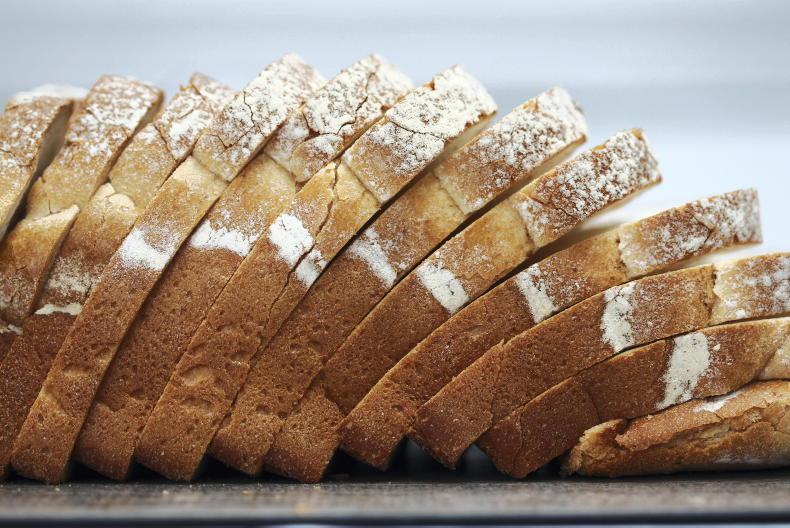
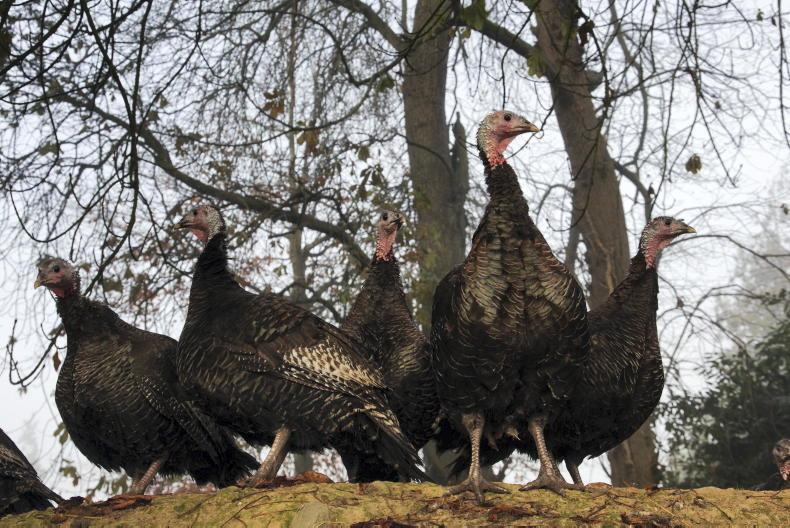
SHARING OPTIONS